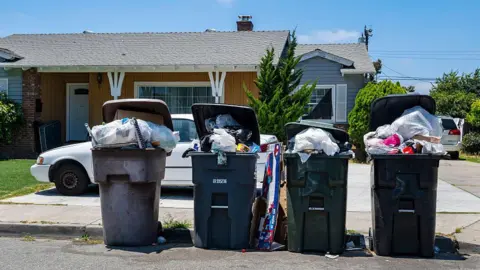### Summer of Stink: The Garbage Labor Dispute in the United States
As summer swelters across the United States, a disagreeable situation unfolds: cities from Boston to California are engulfed in unpleasant odors emanating from heaps of uncollected garbage. This alarming condition has its roots in labor disputes involving Republic Services, a prominent private waste management company. Over three weeks have passed since a strike began, and as garbage bags pile up in dumpsters, tensions rise between the company and its workforce.
Republic Services, a Fortune 500 firm contracted for waste management in numerous municipalities, has seen its employees—represented by the Teamsters union—refuse to perform collection duties. The union claims its members are underpaid compared to their counterparts in sanitation and have inferior benefits. Conversely, Republic insists that union leadership is unwilling to negotiate, resulting in an impasse that only exacerbates the refuse crisis.
The labor strike officially commenced on July 1, initiated by Teamsters Local 25, which services 14 communities in the Greater Boston area. The strike’s influence quickly spread, encompassing multiple cities across the country, including Manteca in California, Ottawa in Illinois, Cumming in Georgia, and Lacey in Washington. Reports indicate that more than 2,000 garbage collectors are participating in the walkout, affecting millions of Americans. Mike Ortiz, a truck driver with 17 years of experience in the industry, lamented, “The cost of living is high—what they’re offering wouldn’t sustain me for a month.”
Despite a few localized settlements, many striking workers remain unsatisfied. Overflowing garbage poses a public health risk, compounding frustrations among residents who encounter the deleterious effects of uncollected waste daily. In the coastal city of Gloucester, Massachusetts, Mayor Greg Vargas articulated the strife: foul odors of decaying refuse disrupt daily life, and he has joined forces with several municipalities to initiate legal action against Republic Services for breach of contract.
Amid the rancid refuse, Republic Services has countered the Teamsters’ actions by filing a lawsuit, claiming their behavior is illegal. In stark statements, the company depicted union members as engaging in “criminal behavior” and promoting “chaos” rather than pursuing agreements. The union has disputed these accusations, maintaining that their actions are necessary to advocate for fair treatment.
While larger urban areas like New York and Philadelphia have public sanitation employees, many smaller cities have outsourced waste management to private firms like Republic Services. Founded over 40 years ago, the company’s financial success hinges on their slogan of invisibility: out of sight, out of mind. However, when refuse stacks up, the implications are stark.
Experts suggest that the striking workers wield considerable leverage. Sarah A. Moore, a professor at the University of Wisconsin-Madison, notes societal associations between waste and poverty or disease. The presence of rotting garbage prompts residents to speak out, advocating for better working conditions for garbage collectors. In cities like Philadelphia, labor disputes often result in swift resolutions when public health risks become pronounced.
After the strikes in Lacey and Manteca concluded with agreements, residents reported the dire need for effective waste management. Echoing their sentiments, Eric Fiel, a veteran sanitation worker, highlighted deteriorating conditions and equipment issues at Republic-managed disposal sites. Dangerous work conditions exacerbate dissatisfaction, as noted by Will Zekas, who expressed pride in participating in a nationwide effort, asserting, “Power lies in solidarity.”
Complications persist in negotiations. In regions impacted by the Teamsters Local 25 strike, a speedy resolution appears unlikely, particularly as many towns and cities have begun creative measures to manage refuse during the impasse. Some municipalities have designated dump sites for residents, while Gloucester has redirected municipal resources to address the problem. In Boston, Mayor Michelle Wu threatens fines against Republic Services for noncompliance in refuse collection, underscoring city officials’ frustration.
The situation remains fluid. As garbage piles high and negotiations stall between the Teamsters and Republic Services, the stench of disagreement lingers. Business owners like Glaicy Santos express exasperation at uncollected trash, voicing concerns for public health and their own livelihoods. As tensions simmer, cities, workers, and a waste management giant grapple for resolution in the sweltering heat of summer.












